Training
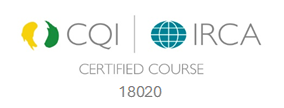
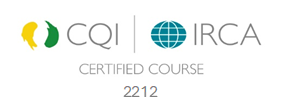
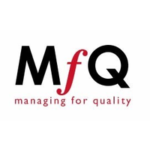

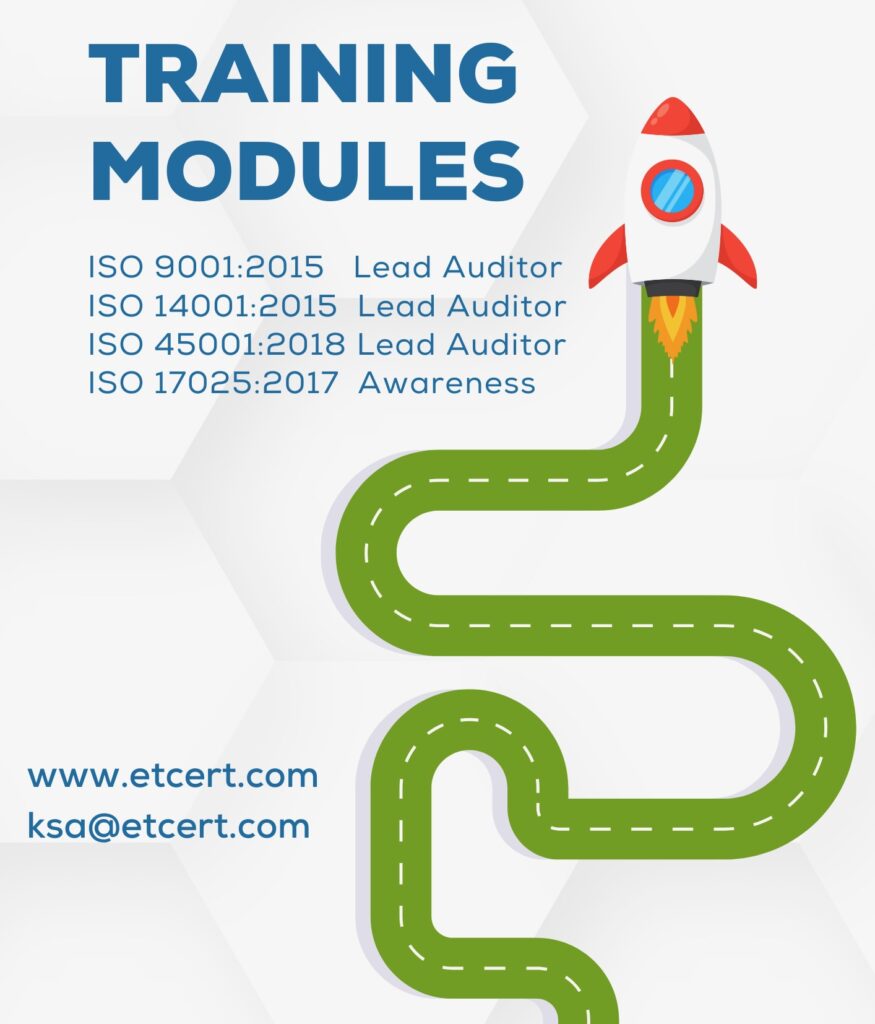
Book training Course
Boost your career with globally recognized Lead auditor certification! Enroll today in our expert-led training courses and gain the skills needed to excel in quality management and auditing. Don’t miss the opportunity to stand out and achieve your professional goals
CQI and IRCA Certified Courses
Ethical Certifications is proud to partner with Managing for Quality (MFQ), a leading UK-based training provider and CQI and IRCA Approved Training Partner, to deliver internationally recognized training courses in management systems and auditing.
Together, we are pleased to launch a series of CQI and IRCA Certified Auditor Training Courses designed to equip professionals with the practical skills and knowledge needed to lead and manage audits in compliance with ISO standards. These programs support career growth and organizational excellence in quality, food safety, environmental management, and occupational health & safety.
With over 30 years of global training and auditing experience, MFQ has delivered courses across diverse sectors including nuclear, chemical, public services, military, and healthcare. Their proven track record, combined with Ethical Certifications’ accreditation and industry reach, ensures a world-class learning experience tailored to real-world implementation.
Courses are available onsite, online, and in hybrid formats, allowing flexible access for professionals across regions.
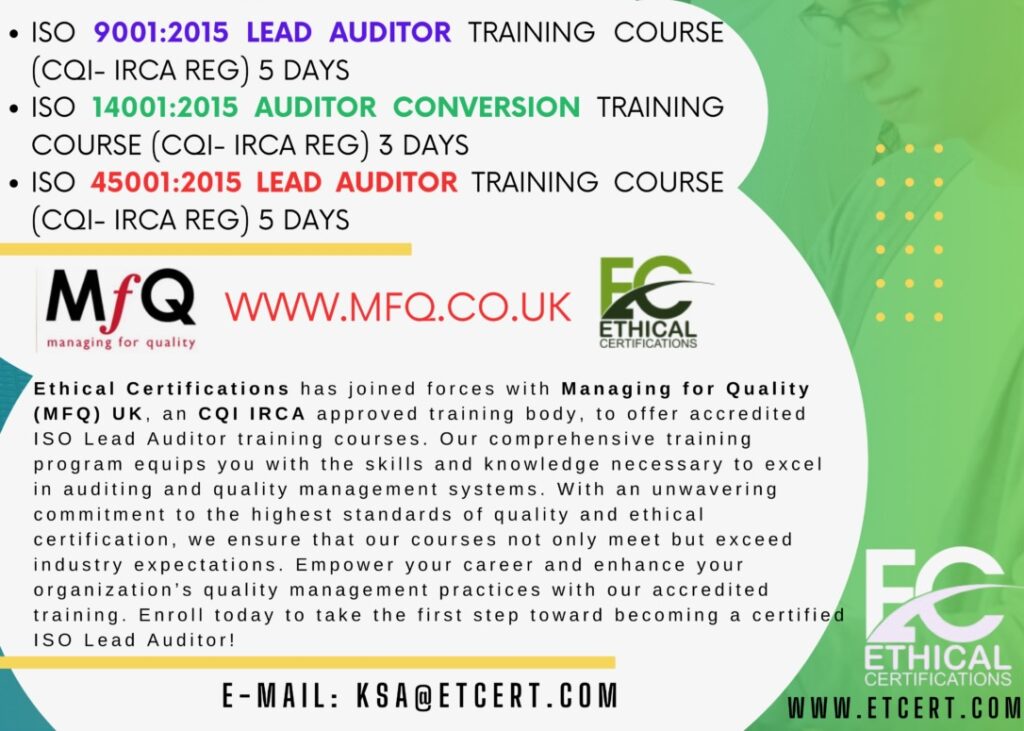

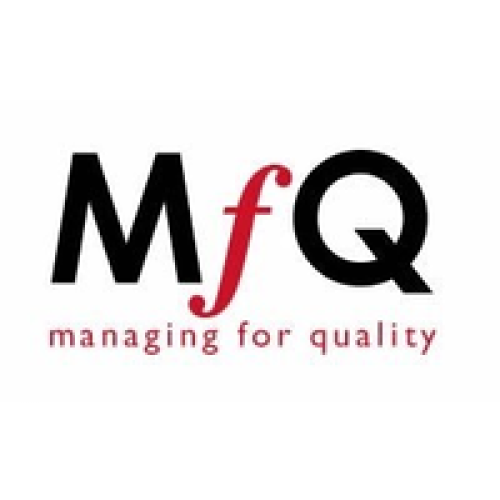
Benefits of CQI and IRCA Certified courses
The focus of the CQI and IRCA Certified Training course is on understanding and applying the ‘skills’ needed to be a successful QMS/EMS/OHSMS auditor. Here lectures are kept to a minimum, with learning provided through exercises, discussion, role play and presentations from attendees. This includes performing all the stages of a Certification Audit. These audits are performed on a realistic and simulated Company with a fully functioning ISO 9001:2015, ISO 14001:2015 & ISO 45001:2018 system.
Practical Auditing Examples
0%
Skill Development
0%
Career Advancement
0%
Networking with Professionals
0%
CQI and IRCA certification opens doors to global opportunities.
Our International training provides professionals with the opportunity to develop global competencies, enhancing their ability to work in diverse and multinational environments. It fosters a deeper understanding of different industries and business practices, which is crucial for effective collaboration across borders. Additionally, international training often leads to globally recognized IRCA certifications, boosting credibility and career prospects. The exposure to varied approaches and innovative problem-solving techniques strengthens adaptability and broadens one’s professional network, offering opportunities for growth and collaboration at a global level
Undertaking CQI and IRCA-approved training is highly beneficial for professionals in quality and auditing. These courses are internationally recognized, providing credibility and enhancing career prospects in industries that value quality management and compliance. IRCA certification ensures that you meet global standards, which increases employability and opens up opportunities to work with international clients or organizations. The training equips you with practical skills in auditing, risk management, and continuous improvement, ensuring you are well-prepared to contribute effectively to your organization’s quality processes.
Prior Knowledge for Lead Auditor Training
To get the most value from the Lead Auditor Training Course, candidates should have a good understanding of quality management principles, ISO 9001 fundamentals, and basic quality control methods. This foundation ensures you can focus on developing the specialized skills needed to conduct professional audits.
1. Quality Management Principles (QMPs)
The seven Quality Management Principles (QMPs) form the backbone of ISO 9001 and other management system standards. These principles guide organizations in achieving sustained success and continuous improvement.
The Seven Principles are:
Customer Focus – Organizations depend on customers; meeting their needs and striving to exceed expectations is key to success.
Leadership – Leaders create unity of purpose, set direction, and foster an environment where people are engaged.
Engagement of People – Competent, empowered, and engaged employees at all levels enhance organizational performance.
Process Approach – Results are achieved more consistently and effectively when activities are managed as interrelated processes.
Improvement – Continuous improvement is a permanent objective for any organization.
Evidence-Based Decision Making – Decisions based on the analysis of reliable data lead to better outcomes.
Relationship Management – Sustaining relationships with suppliers, partners, and stakeholders helps optimize performance.
✅ Why It Matters: Understanding these principles helps auditors evaluate how well an organization has embedded them into daily operations, culture, and long-term strategy.
2. What is Quality?
In ISO 9001:2015, quality is defined as:
“The degree to which a set of inherent characteristics of an object fulfills requirements.”
Key insight: Quality is about consistently meeting requirements — whether related to customer expectations, regulatory needs, or business goals.
✅ Why It Matters: As a future auditor, recognizing how “quality” is defined ensures you can properly assess compliance and performance during audits.
3. Quality Control (QC)
Quality Control ensures that processes consistently produce results that meet specifications. Candidates should understand how inspection data and process feedback are used for continuous improvement.
Key Methods:
Statistical Quality Control (SQC): Focuses on monitoring product quality, often using statistical sampling systems (e.g., ISO 2859).
Statistical Process Control (SPC): Focuses on monitoring and adjusting processes to prevent non-conformance.
✅ Why It Matters: Auditors must recognize how organizations control variation and reduce risks through effective QC systems.
4. Key ISO 9001:2015 Concepts
To succeed in the course, you should be familiar with the structure and intent of ISO 9001:2015, including:
Context of the Organization – identifying internal and external issues, stakeholders, and their needs.
Risk-Based Thinking – integrating proactive risk and opportunity management into processes.
Organizational Knowledge – managing essential knowledge for sustainable performance.
Documented Information – maintaining evidence of compliance, procedures, and results.
✅ Why It Matters: A strong grasp of these concepts helps you audit not just for compliance, but for effectiveness and improvement opportunities.
5. Benefits of Quality Management Systems (QMS)
Understanding the value of QMS helps candidates appreciate why audits are vital for organizations.
For Organizations:
Improved customer satisfaction through consistent delivery of quality products and services.
Greater efficiency and reduced costs through process optimization.
Enhanced decision-making using reliable data and performance monitoring.
Stronger compliance with legal, regulatory, and industry requirements.
Continuous improvement culture that drives innovation and competitiveness.
Better stakeholder confidence and stronger supplier/customer relationships.
For Professionals (including auditors):
Recognition of industry best practices.
Ability to identify risks and opportunities effectively.
Enhanced career opportunities in auditing, consulting, and quality management.
Skills to add measurable value to any organization.
Why Prior Knowledge Matters for Lead Auditor Training
By developing this foundational knowledge before the course, candidates can:
Accelerate learning and focus on auditing skills instead of basics.
Engage in practical case studies with deeper understanding.
Perform stronger audits by linking principles, processes, and QMS benefits.
Position themselves as trusted professionals capable of guiding organizations toward excellence.
👉 This prior knowledge sets the stage for mastering the Lead Auditor Training Course — equipping you not only to assess compliance, but to drive value, improvement, and confidence in organizations worldwide.
